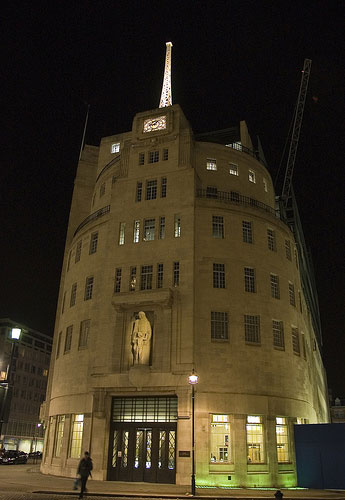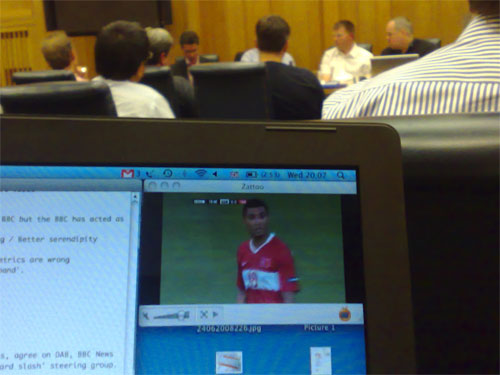Last night's TechCrunch / BBC debate on a 'Common Platform'
Yesterday I went to the joint TechCrunch/BBC debate at Broadcasting House, where a panel discussed some of the issues raised by Mike Butcher's recent posts on TechCrunch UK bemoaning the lack of support the BBC was giving to innovation amongst Britain's web start-ups. The session was recorded, and I'm sure it will be released on backstage.bbc.co.uk or the BBC Internet Blog at some point, and that there will be copious commentary from many of the people there, so I thought I'd keep my observations relatively short. Well, OK, not that short, but 1,000 words is pretty low compared to the average currybetdotnet post about the BBC...

Azeem Azhar has for a long time advocated the BBC releasing a lot of code, although as James Cridland pointed out, you'd be amazed at how poor some of the BBC's production tools are once you remove the 'magic curtain', Azeem argued that there was no excuse for the BBC having 'poor tools'. I disagree with him slightly there, as I think the BBC's broadcasting culture almost certainly guarantees it will always have poor web production tools. This is an organisation that would never agree to having blank screens on BBC One for a month whilst upgrading the cameras, and so it has never agreed to a 'no new features' moratorium whilst the internal Internet production plumbing was given the overhaul it needed. Even now, new publishing platforms are coming out of producing new products, not just because they are needed.
James Cridland and Jem Stone both put the defence case for the BBC - that it has done a lot more than it is given credit for. Jem seemed concerned that a ground-swell of 'what have the Romans ever done for us' at the start-up level could easily be interpreted, alongside the more established complaints of groups like BIPA, as an industry wide condemnation of bbc.co.uk. James Cridland explained how his department is trying to take the radio mantra of 'Agree on technology, compete on content' into the 21st century online by working with commercial broadcasters to set some common Internet radio standards.
Tom Loosemore, who currently seems to be working just about anywhere where there is digital policy to be written, outlined 7 things he thought the BBC could or should do better. Of these the couple that stood out for me were more free publication of research data, and using the 'Trusted Guide' aspect of their operation to drive much more traffic to UK start-up sites. He thought that the BBC had been 'lamentable' at that, chiefly because the metrics by which the site is measured do not encourage it.
Tom's other mantra was a warning about the future of Net neutrality:
"We take the Internet for granted. It is not a bunch of pipes linked together. It is a very counter-intuitive philosophy about treating all data equally."
He fears that the roots of the network, based in academia, will be swamped by the commercialisation of data delivery by ISPs in 'next generation broadband'.
Jon Gisby was representing Channel 4, and had a tough job to get a word in during a very BBC-centric debate, but he had some optimistic things to say about the 4IP initiative. He felt that Channel 4 had a long history of taking niche and 'long tail' interests to mainstream television. Coupled with their experience in mixing the public service and commercial business models, this put them in a better position than the BBC to build a public service 'platform'.
Tony Ageh, described as an invisible man who could deflect radar, went last, and took great delight in being able to agree with aspects of what nearly everybody had said so far, including Mike Butcher's original 'While the BBC fiddles' post.
Nick Reynolds made a couple of contributions from the floor, to argue that regulation and policy were not the problem that the BBC faced, because the Charter was a very loosely worded document. Mind you, there are a lot of areas of the BBC where the fear of regulation stifles innovation at birth, regardless of what the documents actually say.
Another useful contribution from the floor came from someone whose name I didn't catch who works at the BBC Trust (but is not one of the Trustees). She pointed out that arguments that senior people within the BBC need to 'get religion' about the Corporation being a new media 'platform' miss a crucial point. It would also have to be the Government, Ofcom, the opposition parties, and the EU who 'got religion' at the same time for it to be able to happen.
My own take on this is that the unwritten rule #1 of the Director-General's job description has to be ensuring that there will be a Director-General to follow him/her. I can't ever see the 'new media platform' idea being the tipping point between whether the BBC continues to get a unique funding settlement or not, and so for all the positive noises at the centre of the BBC, the reach and perceived audience value of BBC One and Radio 4 are always going to be more 'mission critical' than whether playlist data is available, or the BBC's software is open-sourced.
Given the feedback from the actual developers and entrepreneurs in the audience, it seemed that the most important thing the BBC could do in the short term would be to release more data of any, more consistently, and with a more relaxed licensing framework that allowed for the potential of commercial use. It also seems hard to contact the right person at the BBC. Jem did point out that a lot of the BBC people in the room had very high profiles on the Internet, but, to be honest, knowing the names of some members of staff, and finding their blogs, is not the most sophisticated corporate comms policy I've ever heard.
Ian Forrester suggested that where the BBC hadn't been able to release data for commercial use, it had been able to act as an 'honest broker' between the would-be developer and the original data source. There was a general plea from the BBC guys that if people simply asked, the chances were that they could make an arrangement, although chair Steve Bowbrick was slightly doubtful that anything that included having meetings could strictly be called an API!
One slight annoyance - although it had 'sold out', there were plenty of no shows on the night, which meant that people who could have easily fitted into Broadcasting House's fine art deco 'council chamber' were not able to go. Tricky, because obviously it was great that the debate was free, but some nominal entry fee (donated to Children In Need, of course) may have allowed the organisers to more accurately gauge audience numbers.
Finally, thanks to George Wright's wifi set-up, I was able to quietly stream Euro2008 at the back of the room... ;-)

I was one of those who booked, but couldn't make it (wasn't feeling well), so sorry about that.
Fear of regulation is not the same thing as the
regulation itself. That's more of a problem with the BBC's culture than its regulation.
I think I didn't really mean that the the Charter was "loosely worded". It's actually quite clear but broad and not restrictive in my opinon.